What causes gastroenteritis in cats? This common condition is often caused by an infection from contaminated food. Gastroenteritis is basically an inflammatory disorder that affects the stomach and intestines, which causes major problems like vomiting, diarrhea, and abdominal pain. Salmonella and E. Bacteria such as coli, parasites such as giardia, and viruses such as rotavirus can cause gastroenteritis when ingested through spoiled or raw food.
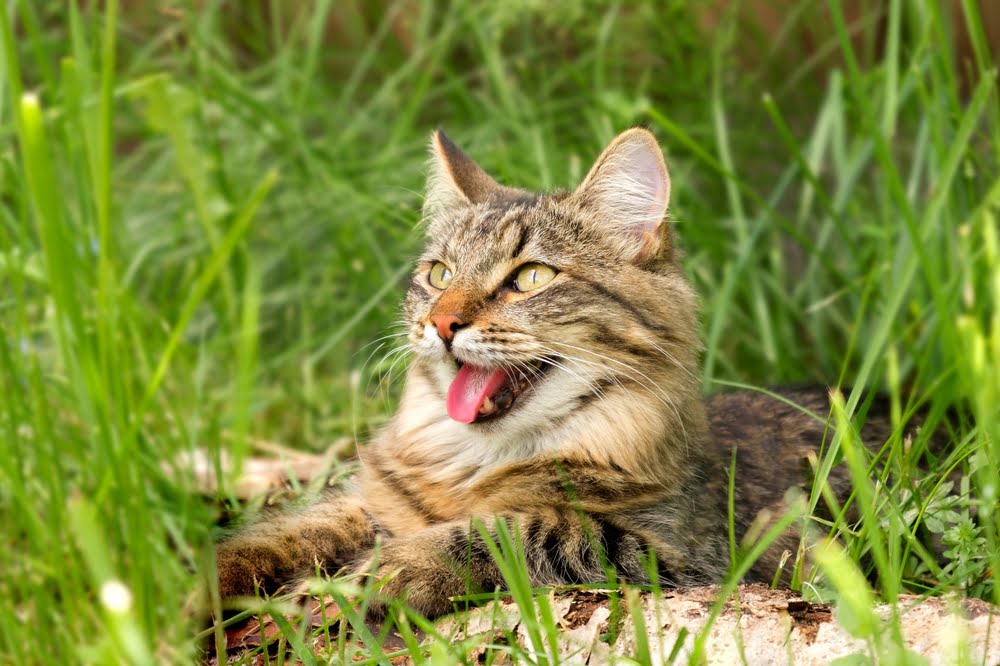
Feline gastroenteritis is largely avoidable with good hygiene and food handling practices. Feeding your pet premium, well-prepared food reduces the risk of parasitic and bacterial diseases. In addition, routine veterinary exams ensure the continued health of your beloved cat’s digestive system. They can also help identify and manage early signs of illness. You can prevent gastroenteritis in cats. For this, you need to take important steps. Keeping a clean and hygienic feeding area will help increase your cat’s attention to food which will help ensure their health.
What Causes Gastroenteritis in Cats?
Also known as stomach flu or stomach bug. It is basically a common gastrointestinal disease caused by inflammation of the intestines and stomach. Symptoms of this illness usually include vomiting, diarrhea, abdominal pain, and occasionally fever.
Such as bacteria, viruses, and parasites can cause gastroenteritis. Again viral gastroenteritis is the most common cause, with rotavirus and norovirus being the main culprits, especially in children.
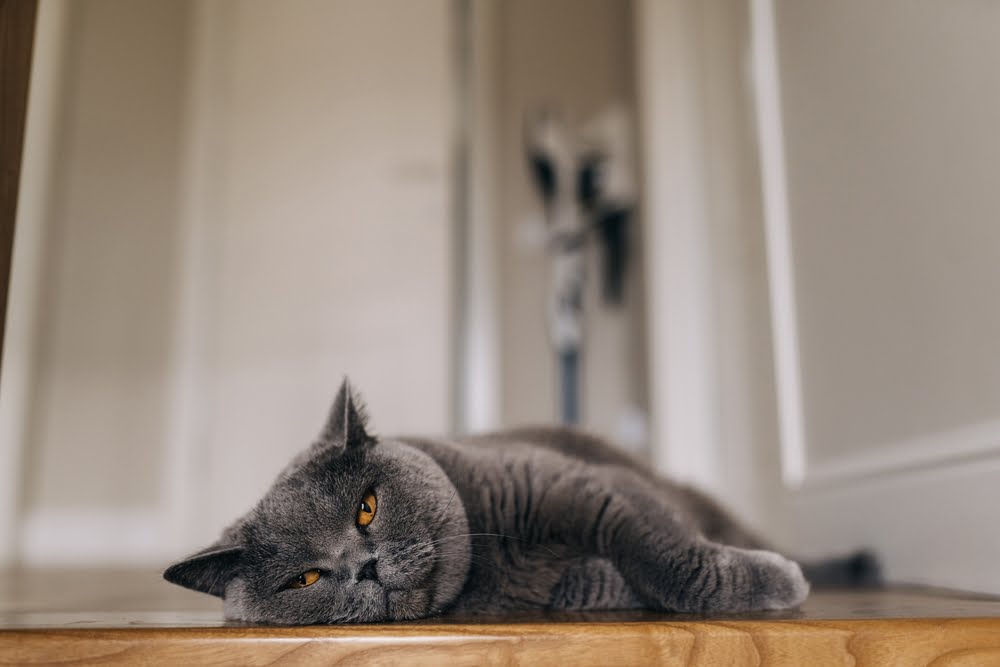
It disrupts and disrupts the normal functioning of the gastroenteritis gastrointestinal system. When a person has gastroenteritis, their stomach and intestines become inflamed, making it difficult for the body to absorb nutrients and water, and fluid is lost from vomiting and diarrhea.
As a result, dehydration becomes a major problem, especially for older and more delicate cats like kittens. Also, the transmissible nature of many of the bacteria that cause gastroenteritis in cats highlights how important it is to follow good sanitation and hygiene measures to prevent the spread of illness in multi-cat households and shelters. Knowing what causes gastroenteritis in cats not only makes management and treatment methods more effective but also emphasizes how important it is to take preventive measures to reduce the negative impact of the illness on the cat’s health and well-being.
Exploring Common Causes of Feline Gastroenteritis
Feline gastroenteritis has many underlying causes. It is characterized by inflammation of the cat’s intestines and stomach. Often eats malnourished, unsuitable, or potentially toxic foods, such as rotten food, foreign objects, or hazardous substances such as certain chemicals or plants. It irritates the gastrointestinal tract and can increase inflammation causing symptoms including vomiting, diarrhea, and abdominal pain.
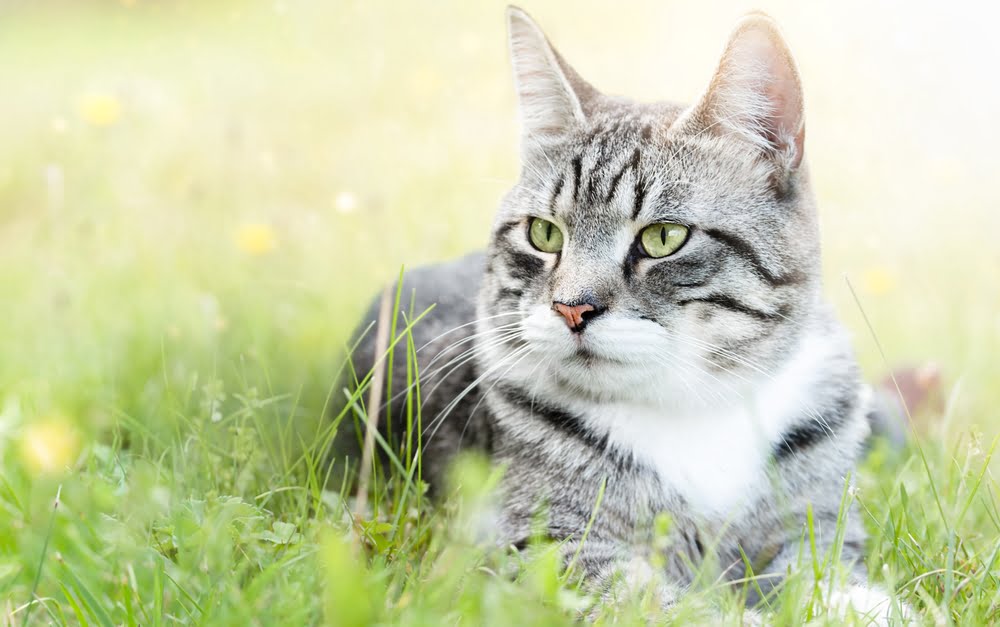
Infectious agents, such as viruses, bacteria and parasites are also often responsible. Feline panleukopenia virus (FPV) and feline coronavirus (FCOV) are two examples of complex viruses that can cause severe gastrointestinal symptoms in cats. These symptoms are often accompanied by fever and dehydration Even cats sometimes die. Feline gastroenteritis has also been associated with parasitic illnesses such as giardiasis and toxoplasmosis, as well as bacterial infections such as salmonella and campylobacteriosis. Treatment is needed to deal with symptoms and stop the spread of this infection, which can be transmitted through contact with contaminated food, water, or infected animals.
Determining the precise etiology is essential to effectively monitor and treat feline gastroenteritis. When a cat has gastroenteritis, supportive care — including food restriction, hydration therapy, and medication to reduce vomiting and diarrhea — is often essential to their recovery. Gastroenteritis is less common in cats who adhere to proper hygiene, are vaccinated against common viral diseases, and live in a clean, risk-free environment.
Bacterial Infections
Bacterial infections are a common culprit behind gastroenteritis in cats. Pathogenic bacteria such as Salmonella and E. coli can infiltrate the feline gastrointestinal tract, causing inflammation and distress. These bacteria typically enter the body through contaminated food or water sources, leading to symptoms like vomiting, diarrhea, and lethargy. What Causes Gastroenteritis in Cats: Viral infections can also trigger gastroenteritis in cats. Despite the challenges posed by bacterial infections, there is hope in effective treatment options available.
Prompt veterinary care with appropriate antibiotics can help combat these infections and alleviate symptoms in affected felines. Additionally, practicing good hygiene and ensuring proper food handling can significantly reduce the risk of bacterial gastroenteritis in cats, promoting their health and well-being.
Viral Infections
In the realm of feline health, viral infections pose a significant threat to our beloved companions. Viruses such as feline calicivirus and feline herpesvirus can wreak havoc on a cat’s gastrointestinal system, leading to severe bouts of gastroenteritis. These microscopic adversaries target the delicate balance within a cat’s body, causing distress and discomfort.
While the thought of viral infections may instill fear, it is crucial to remember that veterinary medicine has made great strides in combating these insidious invaders. Through vaccinations and diligent hygiene practices, we can shield our feline friends from the clutches of viral gastroenteritis. With proper care and timely intervention, cats can emerge victorious in their battle against these invisible foes, ensuring a brighter and healthier future for all furry companions.
Parasites
Parasites, such as roundworms and tapeworms, can wreak havoc on a cat’s gastrointestinal system, leading to gastroenteritis. These insidious invaders thrive in contaminated food or water sources and can cause symptoms like vomiting, diarrhea, and weight loss in cats. Regular deworming and proper hygiene practices can help prevent parasitic infections in our feline companions. The presence of parasites in a cat’s digestive tract is a concerning issue that requires prompt intervention.
By maintaining a clean living environment for your cat and administering preventive treatments as recommended by your veterinarian, you can significantly reduce the risk of parasitic infections. Remember that with proper care and vigilance, you can protect your beloved feline friend from the discomfort and health complications associated with these unwelcome guests.
Contaminated Food
Contaminated food can be a significant culprit in triggering gastroenteritis in cats. Cats are sensitive creatures, and consuming food tainted with harmful bacteria like Salmonella or E. coli can wreak havoc on their delicate digestive systems. Even seemingly fresh food can harbor pathogens if proper handling and storage protocols are not followed diligently. Furthermore, molds that grow on spoiled food can produce mycotoxins that are toxic to cats when ingested. These toxins can lead to gastrointestinal distress and other health complications in felines. It is crucial for cat owners to be vigilant about the quality of the food they provide their pets, ensuring that it is free from contamination that could jeopardize their furry companion’s well-being.
In an effort to reduce the risk of food-contaminated gastroenteritis in cats, one should always store cat food properly. And should ensure that it is properly sealed and kept at the right temperature. Additionally, regularly inspecting pet food for signs of spoilage or unusual odors can help prevent accidental ingestion of contaminated food. By being proactive and attentive to these details, cat owners can protect their beloved pets from unnecessary gastrointestinal upsets caused by contaminated food sources.
Food Allergies
Food Allergies Many felines can develop food allergies, triggering gastrointestinal distress like gastroenteritis. These allergies occur when a cat’s immune system mistakenly identifies a particular food ingredient as harmful.
Symptoms may include vomiting, diarrhea, and skin issues. Identifying and eliminating the allergen from the cat’s diet is crucial for alleviating symptoms and improving their overall health. Remember, with proper management, cats with food allergies can lead happy and comfortable lives free from digestive troubles.
Ingestion of Toxins
Feline Gastroenteritis can also result from the ingestion of toxins. Cats are curious creatures, often exploring their environment with great curiosity. Unfortunately, this curiosity can sometimes lead them to consume toxic substances like household cleaners, certain plants, or even medications left within their reach.
Cat owners must be vigilant and keep all potentially harmful substances out of the reach of their feline companions. Pet-proofing your home and safe storage of toxic items can significantly reduce the risk of your felines ingesting them. Remember, a safe environment is key to a happy and healthy feline friend.
Key Contributors to Gastrointestinal Distress in Cats
Most of the time digestive pain in cats can be caused by parasites, infections, malnutrition, food allergies, intolerances and underlying medical conditions including pancreatitis or inflammatory bowel disease (IBD).
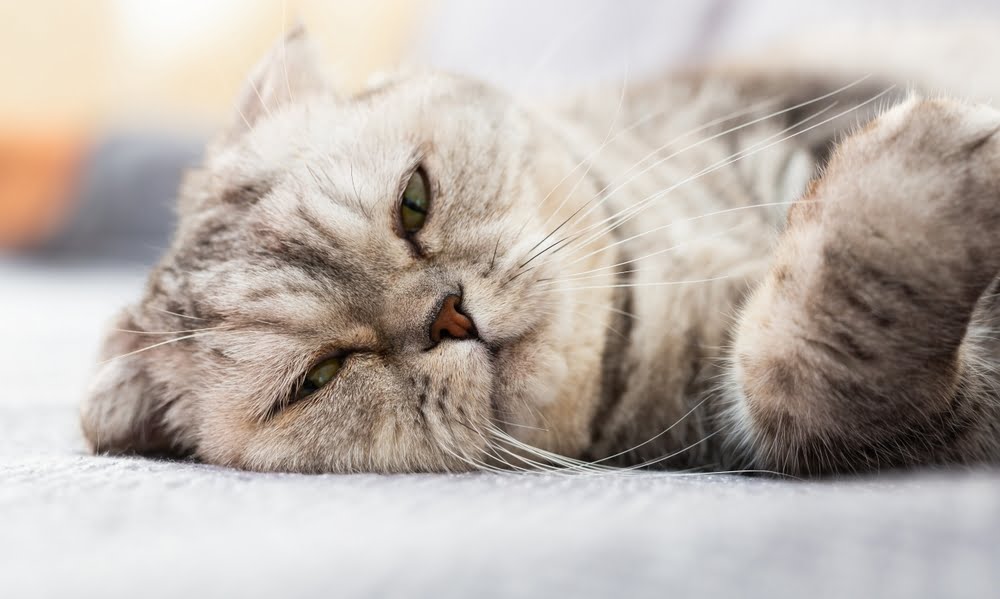
Sudden dietary changes or inappropriate food intake can cause upset stomach, vomiting and diarrhea due to cats’ sensitivity to nutritional changes. Allergies or intolerances to certain foods, including dairy, wheat and certain proteins, can cause gastrointestinal problems in cats.
Also, parasites such as giardia, roundworms, and hookworms can upset a cat’s digestive system. If left untreated, these parasites can cause symptoms such as vomiting, diarrhea, and weight loss. Additionally, gastrointestinal symptoms can range from mild to severe due to bacterial or viral illnesses, such as feline panleukopenia virus or feline coronavirus. Cats with chronic illnesses such as pancreatitis and inflammatory bowel disease may be prescribed long-term therapy regimens.
Several factors can cause gastrointestinal problems in cats, including food allergies, parasites, intestinal infections, and underlying medical conditions. The digestive health of feline friends can be preserved through a balanced diet, ongoing parasite control, and prompt veterinary care for any signs of illness.
Finding Gastroenteritis Triggers in Felines
Feline gastroenteritis can be frustrating for both you and your cat. Determining the exact cause may not be easy, but careful observation can provide important clues. Here’s how to investigate and determine the source of your cat’s diarrhea:
Consistency is optimal for a cat’s digestive system. A change in food that occurs suddenly, such as a brand or recipe, can upset the delicate balance of gut microbes and cause vomiting and diarrhea. Likewise, eating too much dessert or picking up dinner leftovers can overload their digestive system with unhealthy foods. Additionally, there may be underlying food sensitivities during play.
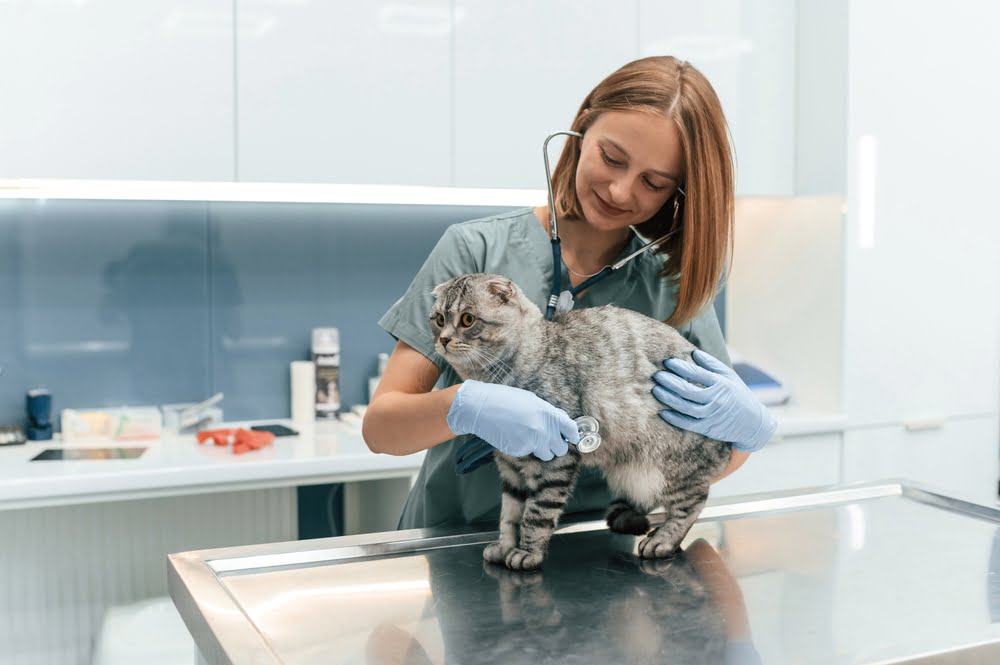
Watch how much food your cat eats, and if they seem to have stomach problems after trying something new, you may want to feed them bland food like boiled chicken and white rice for a short period of time. This can ease their digestive system and make way for faster study.
An increase in anxiety while adapting to a new environment can lead to stomach problems in cats. A new pet, a move, or even a small behavioral change can upset your cat’s delicate digestive system.
Watch for recent changes in the environment that may cause your pet anxiety. By treating the underlying source of their discomfort and creating a relaxing environment, you can help restore gut balance If you suspect a trigger, share your observations with your veterinarian. They can help you implement a plan that will eliminate potential causes and return your feline friend to a state of digestive balance.
How Stress and Toxins Impact Cat Digestive Health
Gastroenteritis in cats can be caused by stress and environmental pollution, with dietary neglect being the most common culprit. Let’s see how harmful these substances are to your cat’s digestive system.
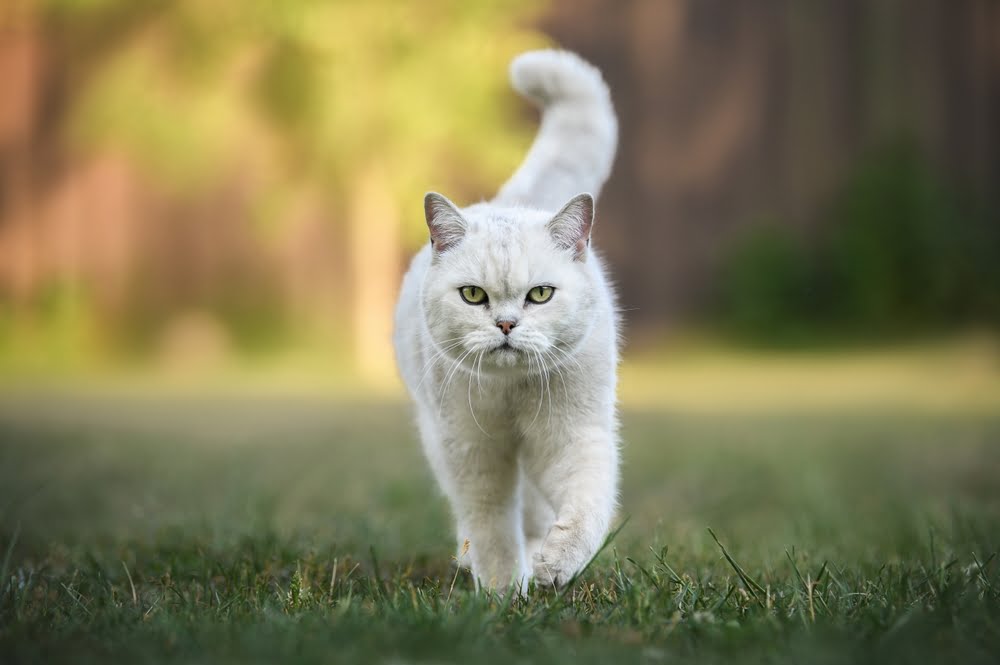
Our feline friends can lead highly sensitive inner lives despite their outward stoicism. Did you know that a cat’s digestive system can suffer greatly from stress? Their stomachs contain a variety of bacteria that are essential for food digestion and general health maintenance. This delicate balance is susceptible to being upset by increasing stress hormones, which can be triggered by a change in environment or getting a new pet.
Such disruptions can lead to inflammation in the digestive tract, leading to painful symptoms including vomiting, diarrhea, and abdominal pain. By recognizing signs of stress and creating a calm environment, you can help prevent gastric distress and preserve your cat’s gut health.
Although we do our best to provide a safe sanctuary for our feline friends, everyday household items can present hidden threats to their digestive systems. Toxins can disrupt your cat’s delicate digestive system. Everything from common plants to household cleaners and even medicines can contain toxins.
Cats are more sensitive to certain chemicals than other pets. It is essential to protect children’s gut health and prevent stomach upsets by keeping them away from potential pollutants. Before giving any medicine to your pet, find and remove any dangerous plants from your home. Also consider using cleaning products that are safe for pets. We should be aware of these hidden dangers. You can always preserve your cat’s best health and protect your cat’s digestive system in the right way.
Be aware of these hidden threats to your cat’s digestive system. Then you can stay away from digestive problems in your beloved cat. And also be able to establish a calm, healthy environment in your home.
Steps to Prevent Gastroenteritis in Cats
Cats are inquisitive creatures that can ingest dangerous things. To prevent gastroenteritis in cats it is important to protect their environment by keeping toxic foods and plants out of reach. Choose premium cat food that is free of additives and preservatives to provide your pet with a balanced diet that improves digestive health.
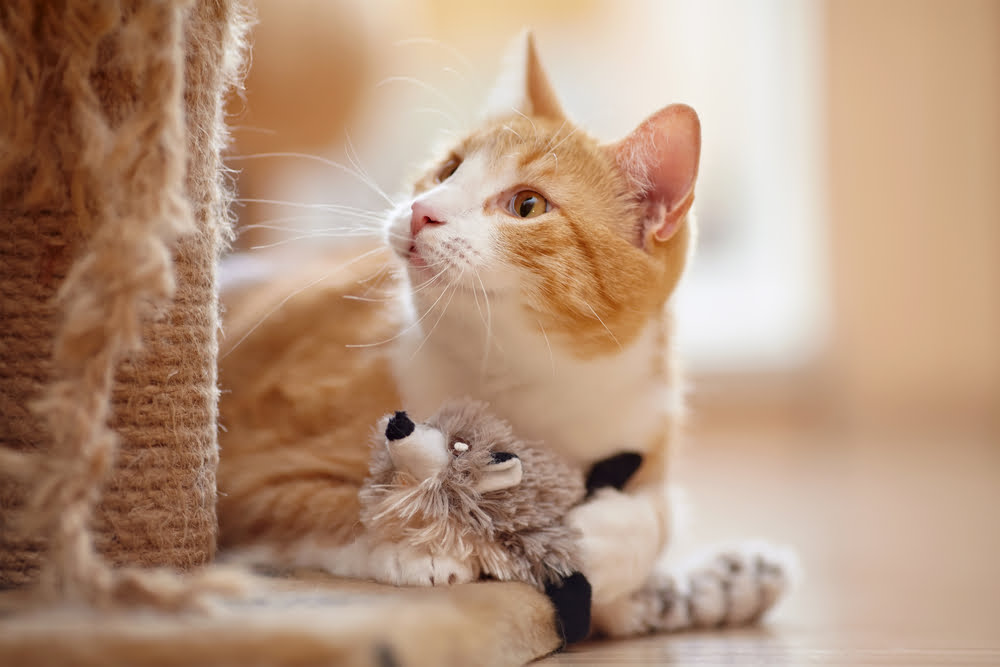
Keep water bowls and feeding bowls clean regularly to avoid bacterial infections and improve your pet’s health in general. Probiotics can help keep your cat’s gut flora healthy, making digestive problems less likely. Provide your feline friend with a stress-free environment as stress can suppress their immune system and increase their susceptibility to disease. Give your cat plenty of access to fresh water to stay hydrated and help remove toxins from their body.
By taking these preventive measures, you can help protect your beloved feline companion from the discomfort of gastroenteritis and increase their lifespan and energy.
FAQ
How Can An Indoor Cat Get Gastroenteritis?
Indoor cats can develop gastroenteritis from a variety of sources. Including eating spoiled or contaminated food, sudden changes in diet, infection (bacterial, viral, or parasitic), ingestion of toxic substances or plants, and stress. Additionally, underlying health conditions such as inflammatory bowel disease or pancreatitis can contribute to gastroenteritis. Maintaining a balanced diet, ensuring food and water cleanliness, and preventing access to harmful substances can help reduce risk.
Can I Feed My Cat Gastroenteritis?
If your cat has gastroenteritis, it’s important to feed them a bland diet to soothe their digestive system. You can give boiled chicken or turkey and white rice. Alternatively, you can provide a prescription diet recommended by your veterinarian. Make sure the cat stays hydrated with plenty of fresh water. Avoid feeding commercial cat food, treats, or any food that can irritate human stomachs. Always consult your veterinarian before making dietary changes.
How Does Domestic Cat Gastroenteritis?
Gastroenteritis in domestic cats is an inflammation of the stomach and intestines, often causing vomiting, diarrhea, and lethargy. Often infections, dietary insecurities or toxins can trigger it. To manage this condition, providing supportive care and ensuring proper hydration is crucial. For owners asking what can I feed my cat with gastroenteritis? We know that boiled chicken and prescribed veterinary diets are among the recommended bland, easily digestible foods. It is important to gradually re-introduce a regular diet after symptoms improve. Always consult a veterinarian for proper advice.
What Do Cats Like When Petted?
Cats usually enjoy grooming on their head, under their chin, and along their back. They often prefer gentle, slow strokes and may twitch when content. However, preferences can vary, and some cats can tolerate only brief petting sessions.
It is essential to observe their reactions to make sure they are comfortable. On a different note what causes gastroenteritis in cats? is a concern for many pet owners. This situation can be caused by infection, dietary changes, ingestion of toxins, or food allergies. Recognizing early symptoms can help them manage their health effectively.
Ensuring Your Furry’s Companion’s Complete Well-being
After exploring what causes gastroenteritis in cats, it is evident that prevention and early intervention are crucial in maintaining your feline companion’s health. By being mindful of their diet, environment, and overall well-being, you can significantly reduce the risk of them developing this ailment.
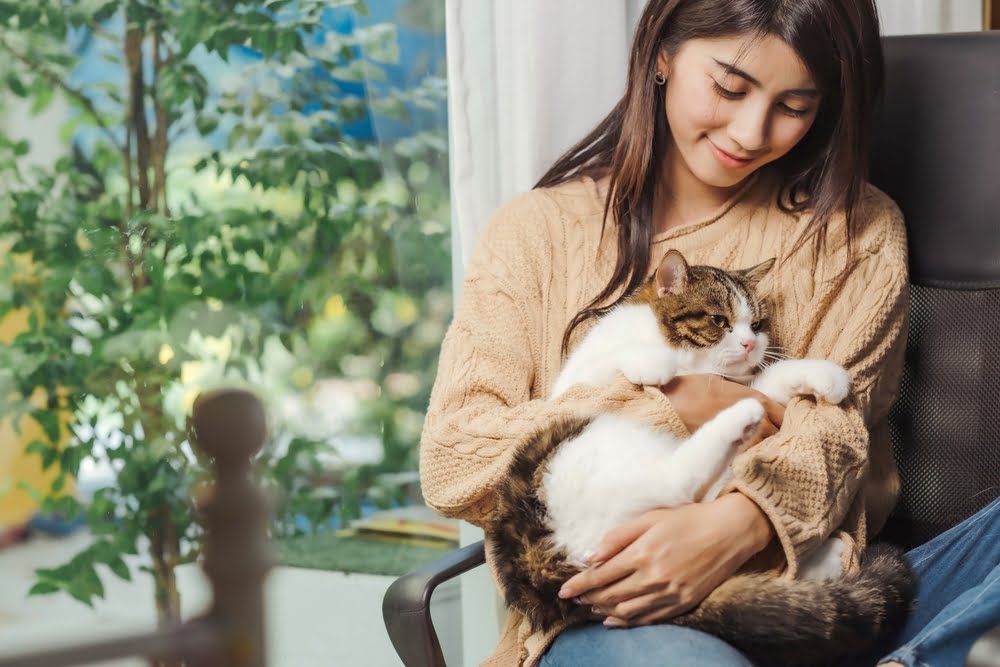
Although gastroenteritis can be a concern for cat owners, most cases can be effectively treated and managed with proper care and attention. By working closely with your veterinarian and following their recommendations, you can help your beloved pet recover swiftly and return to their playful, joyful self.
